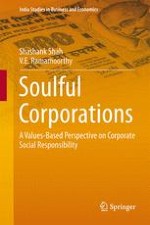2014 | OriginalPaper | Buchkapitel
6. Corporate Social Responsibility: Can Companies Make a Difference?
verfasst von : Shashank Shah, V. E. Ramamoorthy
Erschienen in: Soulful Corporations
Verlag: Springer India
Aktivieren Sie unsere intelligente Suche, um passende Fachinhalte oder Patente zu finden.
Wählen Sie Textabschnitte aus um mit Künstlicher Intelligenz passenden Patente zu finden. powered by
Markieren Sie Textabschnitte, um KI-gestützt weitere passende Inhalte zu finden. powered by
Abstract
Corporate Social Responsibility means something but not always the same thing to everybody. To some it conveys the idea of legal responsibility or liability; to others it means socially responsible behaviour in the ethical sense; to still others the meaning transmitted is that of ‘responsible for’ in a causal mode; many simply equate it with a charitable contribution; some take it to mean socially conscious; many of those who embrace it more formally see it as a mere synonym for legitimacy in the context of belonging or being proper or valid; a few see a sort of fiduciary duty imposing higher standards of behaviour on businessmen than on citizens at large.
